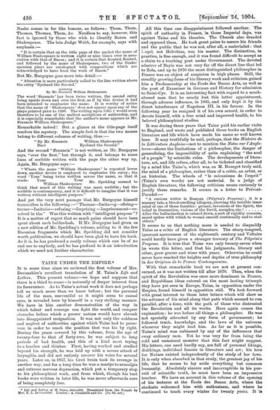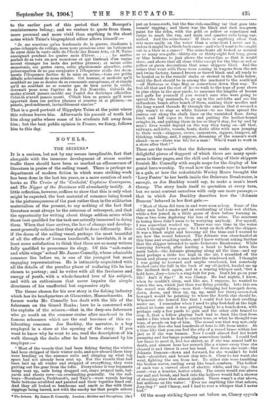TAINE UNDER THE EMPIRE.*
iT is some time since we reviewed the first volume of Mrs. Devonshire's excellent translation of M. Taine's Life and Letters. This present volume—we hope and suppose that there is a third to come—is naturally of deeper interest than its forerunner. As to Taine's actual work it does not perhaps tell us much more than we knew before ; but the personal life of the man, uneventful as it might seem to casual eyes, is revealed here by himself in a very striking manner. We have in him another demonstration of the way in which talent and courage can fight the world, and conquer obstacles before which a poorer nature would have shrunk into disappointed resignation. It was not only the coldness and neglect of authorities against which Taine had to perse- vere in order to reach the position that was his by right. During the years covered by this volume, from the age of twenty-four to that of forty-two, he was subject to long periods of bad health, and this of a kind most trying to a teacher and thinker. First, having worked and studied beyond his strength, he was laid up with a severe attack of laryngitis, and did not entirely recover his voice for several years. Later on, in 1857, his tired brain took its revenge in another way, and for a long time he was a martyr to neuralgia and extreme nervous depression, which put a temporary stop to his philosophical work, and from which, though his best books were written in later life, he was never afterwards sure of being completely free.
All this time one disappointment followed another. The spirit of authority in France, in those Imperial days, was against Table and his theories. The Church also dreaded and opposed them. He took great pains to assure his friends and the public that he was not, after all, a materialist : that Eegel, not Helvetius, was his master. The distinction, in practice, is fine enough, and it was found difficult to accept as a claim to a teaching post under Government. The devoted admirer of Beyle was not very far off the direct line that led to Zola, and up to 1870 the most distinguished philosopher in France was an object of suspicion in high places. Still, the steadily growing fame of his literary work and criticism gained him a Professorship at the Ecole des Beaux Arta, as well as the post of Examiner in German and History for admission to Saint-Cyr. It is an interesting fact with regard to a much. abused man that he nearly lost this latter appointment, through adverse influence, in 1865, and only kept it by the direct interference of Napoleon III. in his favour. In the following year be resigned it of his own accord, in order to devote himself, with a free mind and improved health, to his beloved philosophical studies.
It was during these years that Taine paid his earlier visits to England, and wrote and published those books on English
literature and life which have made his name so well known here. It may truthfully be said, perhaps, that the Histoire de La Litterature Anglaise—not to mention the Notes stir r Angle-
terre—shows the limitations of a philosopher, the danger of generalising, the impossibility of quite explaining "the soul of a people" by scientific rules. The developments of litera- ture, art, and life refuse, after all, to be ticketed and classified by a mind like Taine's, which was, as M. Bourget truly said, the mind of a philosopher, rather than of a critic, an artist, or an historian. The wheels of "le mecanisme de resprit " (Taine's own words) are not material. In a judge of English literature, the following criticism seems curiously to justify these remarks. It occurs in a letter to Prevost- Paradol :—
" A. curious writer is Bunyan (Pilgrim's Progress) ; it is a nursery tale, a blood-curdling allegory, showing the terrible inner mind of one of those fanatics : groans, invasions of the Spirit, the
belief in Damnation, visions of the Devil, scruples, etc.! After the hallucination is calmed down, a sort of rigidity remains, moral spikes with which to wound oneself continually and to stab others.'
It seems to us that nothing more is needed to disqualify Taine as a critic of English literature. The sharp-tongued, ignorant narrowness of the eighteenth century and Voltaire could hardly have given a stranger travesty of The Pilgrim's Progress. It is true that Taine was only twenty-seven when he wrote this letter, and that his judgments, literary and other, grew graver and wiser with years. Otherwise he could never have reached the heights and depths of true philosophy in Les Origines de la France Contemporaine.
With that remarkable book we are not at present con- cerned, as it was not written till after 1870. Then, when the spirit of the Revolution was once more dominant in France, and Republican ideas entered on the most lasting triumph they have yet seen in Europe, Taine, in opposition under the Empire, found himself in opposition still. We look forward with great interest to those later letters which will show us the advance of his mind along that path which seemed to run parallel, after a time, with the path of those who distrusted
the Revolution and all its works. Here again comes the explanation : he was before all things a philosopher. He was
not specially attracted by any form of government; he followed truth, knowledge, and the laws of the universe wherever they might lead him. As far as it is possible, Taine's mind was unbiassed by any of the influences that sway ordinary men. Yet he was very far from being the cold and unnatural monster that this fiat might suggest.
His letters, one need hardly say, are full of personal likings, dislikings, individual fancies in literature and art; his love
for Nature existed independently of the study of her laws.
It is only when absorbed in that study, the greatest joy of his life, that he seems to lay aside everything but common humanity. Absolutely sincere and incorruptible in his pur- suit of scientific truth, he must have been an impressive teacher. We have an account in this volume of the opening of his lectures at the Ecole des Beaux Arts, where the students welcomed him with enthusiasm, and where he continued to teach every winter for twenty years. It is to the earlier part of this period that M. Bourget's reminiscences belong ; and we venture to quote from these, more personal and more vivid than anything in the short notes which Taine's biographical editor allows himself :—
" Je me sonviens qu'au lendemain de la guerre, etudiants peine echappes du college, nous nous pressions avec un battement de cceur dans la vast° Belle de fEcole des Beaux Arts, oh M. Thine
enseignait pendant les quatre mois d'hiver Le maitre parlait de sa voix un pen monotone et qui timbrait d'im vague accent etranger les mots des petites phrases ; et memo cette monotonie, ces gestes rares, cette physion.omie absorbee, cotte preoccupation de ne pas surajouter a reloquence reelle des docu- ments reloquence factice de in mise en scene,—tous ces petits details achevaient de nous seduire. Cot homme, si modeste qu'il semblait ne pas se douter de sa renommee europeenne, et si simple no semblait no se saucier quo de bien servir in vent& devenait pour nous rapOtre de la Foi Nouvelle. Celuida du moms n'avait jamais sacrifle Bur fautel des doctrines officielles. n'avait jamais menti. C'etait bien sa pens& qu'il nous apportait dans ces petites phrases si courtes et si pleines,—sa pensee, profondement, invinciblement sincere."
That is a good portrait of Hippolyte Table at the point where this volume leaves him. Afterwards his pursuit of truth led him along paths where some of his students fell away from him ; but the best public opinion in France, we fancy, follows him to this day.







































 Previous page
Previous page